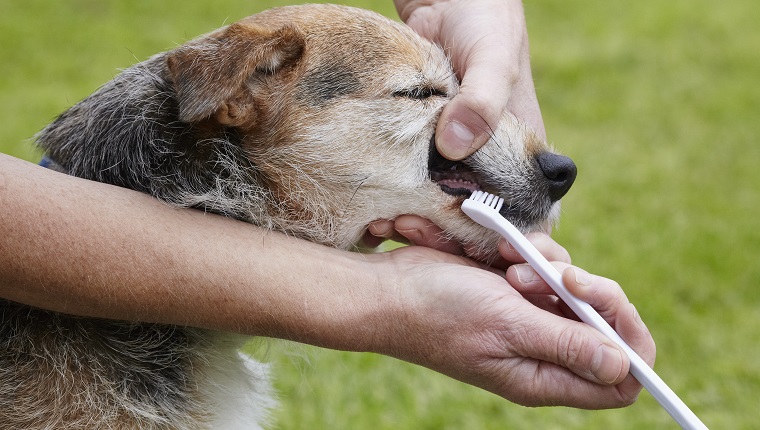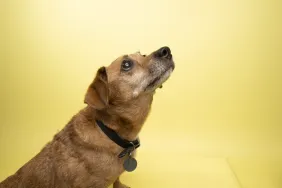Gold Souls, Gray Faces is a series that provides senior dog lovers with tips and advice for the care of beloved older pups. Up to 80 percent of dogs will suffer from gum disease at some point in their lives, and poor dental health can seriously affect seniors’ overall well-being.
Pain in the mouth caused by gum disease can prevent dogs from eating and affect their appetite. Bacteria can make its way from the gums into the bloodstream and affect the heart, kidneys, liver, and important bodily functions.
For a senior dog whose immune system may already be compromised or not work as well as it used to, that can be disastrous.
Keeping your old dog’s teeth and gums clean can improve their overall health, help ward off diseases, and reduce pain.
Here are six tips that will help you keep your senior dog’s teeth clean and maintain their oral health.
It’s not always easy to stay on top of your senior’s oral hygiene. However, it will help your senior dog stick around longer and provide you with several more years of unconditional love.
What other tips do you have for keeping senior dogs’ mouths clean? What problems have you run into when it comes to your senior’s oral health? Let us know in the comments below!
Click the bold links in the article to shop for your dog and support our content!
Tips For Cleaning Your Senior Dog's Teeth
-
Talk To Your Vet About Professional Cleaning
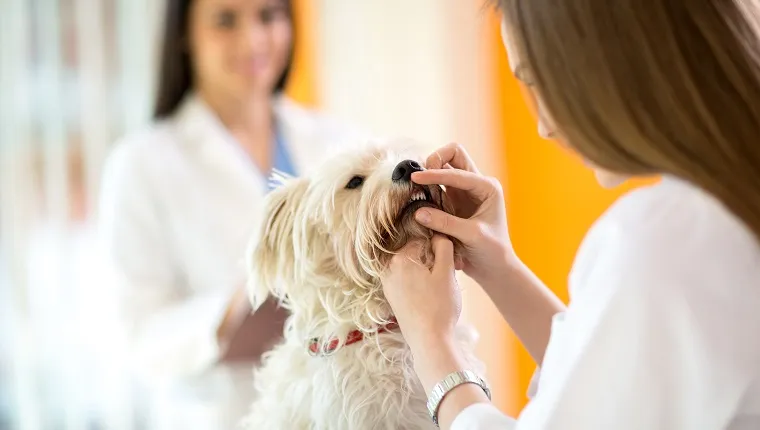
(Picture Credit: LuckyBusiness/Getty Images)
Many pet parents of senior dogs worry about any procedures where their pups have to be put under anesthesia, and that's necessary during a full dental cleaning.
If that's a concern for you and your senior, talk to your veterinarian about your dog's health and whether the risks associated with anesthesia are worth the benefits of a full dental cleaning.
Modern anesthesia and veterinary practices before cleanings are the safest they've ever been, but there are always things that can go wrong during any procedure.
Here are a few concerns you should talk to your veterinarian about so they can fully explain the risks of anesthesia for dogs:
- Bad reactions to anesthesia
- Lowered blood pressure, heart rate, body temperature, and blood oxygen
- Aspiration and acid reflux
- Longer recovery time
- Depressed organ functions
- Tracheal irritation
Making sure that your vet has a complete and up-to-date medical history for your dog, including any conditions that currently affect them and medications they take. It will help to determine if anesthesia is safe.
Before any procedure that requires anesthesia, your dog must get full blood work and a medical examination.
A full, professional dental cleaning is the best way to make sure your dog's teeth and gums are as clean as possible, and it's the only way to ensure that harmful tartar and plaque build-up below the gum line are properly dealt with.
For all the benefits for your senior dog's health that come with a professional teeth cleaning, it's usually worth taking the risks of performing the procedure; however, only you and your vet can decide what's right for your dog.
Anesthesia-Free Dental Cleanings
There is another option of anesthesia-free dental cleanings for dogs.
This option may seem appealing because it's cheaper and doesn't come with the risks of anesthesia; however, these procedures are mostly cosmetic and usually do not include cleaning under the gums and polishing the teeth.
It may be a better option than nothing if your dog can't have anesthesia, and maybe some professionals who offer the procedure are more thorough than others. Again, you must discuss this option with your vet.
Your dog is an individual with unique needs, and this article cannot take the place of the personalized care your veterinarian is capable of. There is no one-size-fits-all solution for every dog.
-
Train Your Senior To Be Comfortable With You Touching Their Mouth
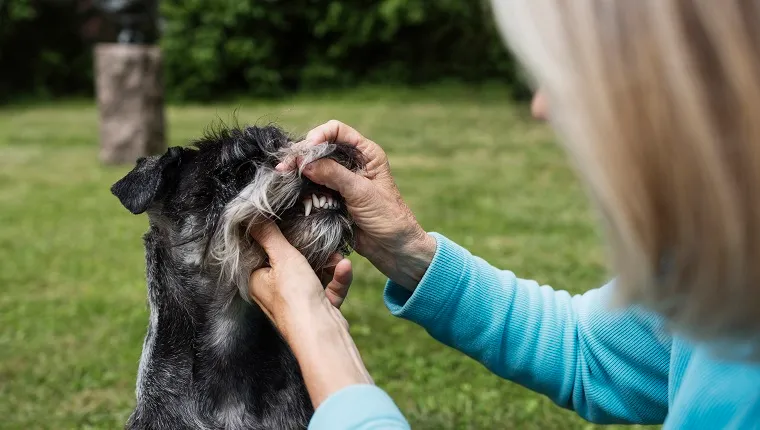
(Picture Credit: Maskot/Getty Images)
If you're going to provide proper dental care for your senior dog and check regularly for signs of gum disease, your pooch will have to be fairly comfortable with you touching their mouth.
If they aren't used to it by now, don't worry. Contrary to popular belief, old dogs can learn new tricks, and your pup can learn to relax when you poke and prod around their chompers.
That said, it can be very tough if your dog already experiences pain in their mouth from gum disease, and they may be protective of sensitive areas. Training can be slow, but this is important.
What kinds of things put your dog at ease? Do they like being rubbed behind the ears, or being talked to in a soothing voice, or having a comfort item nearby? You should use whatever it takes to help them stay calm, and then you can start slowly.
Maybe give them some pets on the head at first and move your hand to their chin. Let them know you're at ease, too, as they can pick up on your emotions and have a negative response.
Hand-feed them treats to show your dog that they can trust that your hands won't harm them. You can try dipping your fingers in chicken broth if it helps.
Practice lifting their lips to expose the teeth, and then move on to touching the teeth directly. Building trust will help reduce anxiety and help your dog stay relaxed when you touch their mouth, but it takes time and will probably not happen in a day.
If you absolutely cannot get your dog to comfortably open wide for you, you may want to ask your vet or a behaviorist for some advice.
It's possible that your dog is in too much pain or is too anxious to let anyone near their gums or teeth, and while a professional cleaning should reduce that pain, the guarding behavior may not disappear right away.
Don't give up. Your vet can help.
-
Brush Your Senior's Teeth At Home
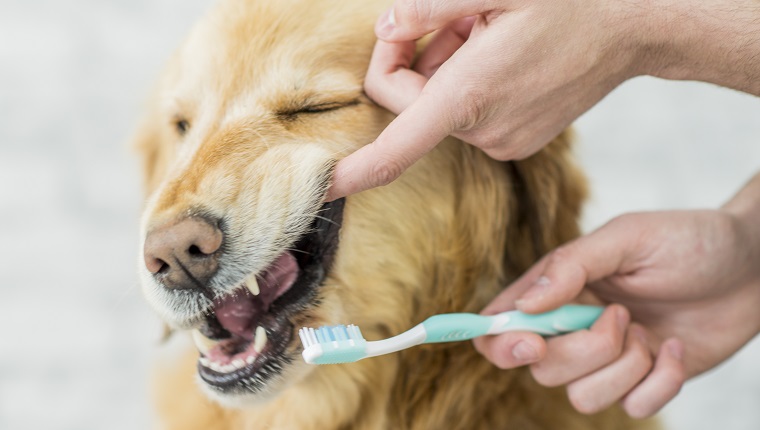
(Picture Credit: FatCamera/Getty Images)
Once your senior dog has had a professional cleaning as recommended by your vet, you should keep up with vet visits every six months, especially once your dog has reached old age. Your vet can take a look at your dog's teeth to keep up with oral health needs and give you advice.
They should also be able to instruct you on how to brush your dog's teeth at home.
Make sure you have the right tools. Dog toothpaste is not the same as human toothpaste, and under no circumstances should you use human toothpaste for your pup.
Toothbrushes for dogs are sometimes finger coverings that have short, rubbery bristles. These slip over your finger so you can brush your dog's teeth.
Other dog toothbrushes look similar to human brushes with bristles on the end of a piece of plastic. These are sometimes a better option if your dog has a smaller mouth or if they nip from time to time.
Your vet can tell you how much toothpaste to use based on your dog's needs. Put the toothpaste on the bristles of the brush as you would do for your own teeth. Start at the front of your dog's mouth and work back, brushing in soft circles.
Try to get the backs of the teeth if you can, but if you can't, don't worry too much. Your dog's tongue does a fairly good job of keeping the backs of the teeth clean.
Most canine toothpaste can be safely swallowed. Just follow your vet's instructions.
-
Chewing Can Keep Teeth Clean
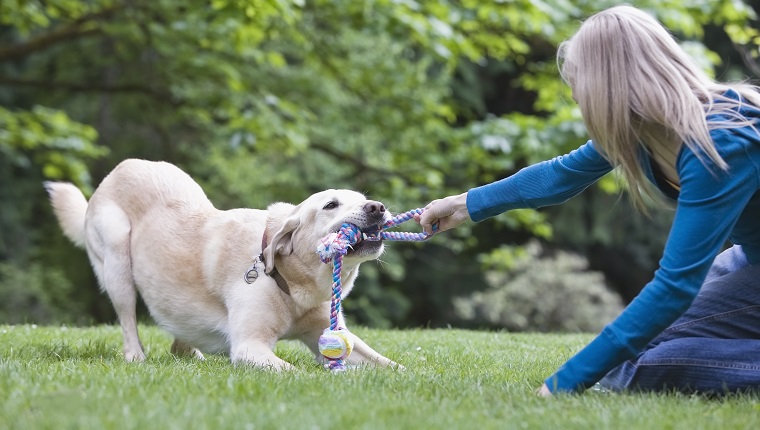
(Picture Credit: Jetta Productions/Walter Hodges/Getty Images)
If your veterinarian determines that your dog's teeth are healthy enough, consider getting your senior some chew toys.
Chewing is mentally stimulating for your pup, but it can also help strengthen their jaw muscles, remove some debris from their teeth, and provide a bit of flossing action to clean some of the harder-to-reach areas of their mouth.
Hard food can also help with this, but you must make healthy decisions about nutrition for your dog. Not all foods are created equal, and your vet or nutritionist can guide you.
Certain treats are designed to help keep your dog's teeth clean, and you should discuss them with your vet. Bones provide younger dogs with similar benefits, but they may not be appropriate for older dogs with sensitive teeth.
-
Adjust Your Dog's Diet
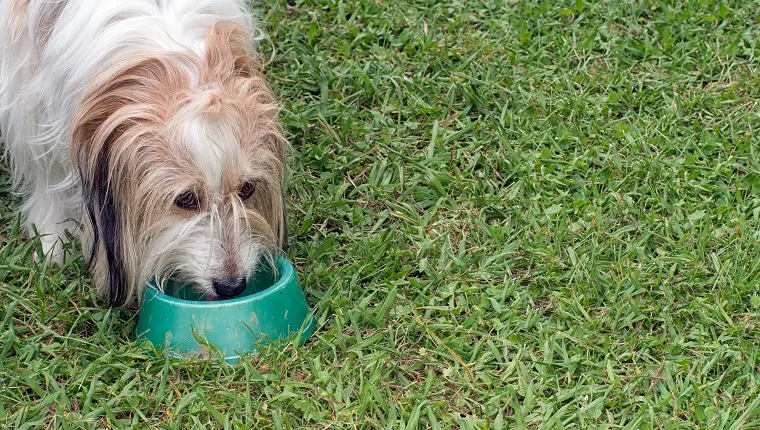
(Picture Credit: Goldfinch4ever/Getty Images)
You should be following your vet or nutritionist's guidelines for a healthy diet when it comes to your senior, but if you are relying on the same old kibble you always have, you may not be providing your senior with what they need.
An inappropriate diet can contribute to the cultivation of harmful bacteria in the mouth. Your dog's diet should primarily be meat-based and include few grains or corn. Unfortunately, these products are often used as filler in kibble, so read your labels.
An appropriate diet will help keep your dog's mouth clean, help their immune system function properly to fight off bacteria, and prevent other dangerous medical conditions.
-
Watch For Signs Of Gum Disease
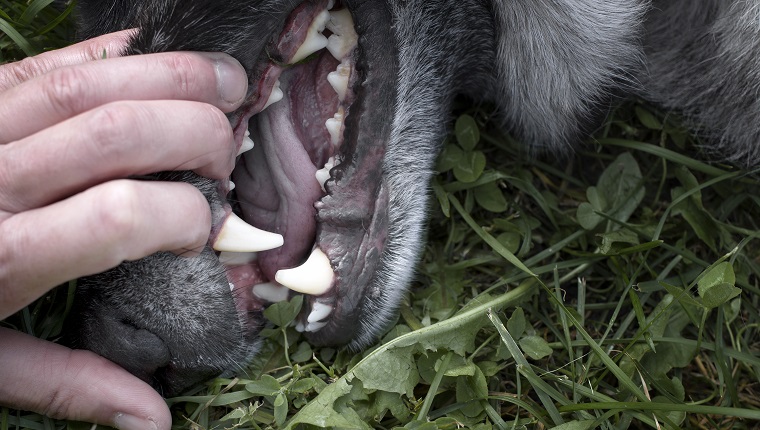
(Picture Credit: victorass88/Getty Images)
Once you have cleaned your dog's teeth and picked up good habits to keep them that way, you must always stay vigilant.
Check your dog's teeth and gums for any symptoms of gum disease and consult your vet if your dog is showing any of the following signs:
- Worsening breath odor
- Pawing or rubbing at the face
- Acting defensive or wincing when touched around the mouth
- Loss of appetite or reluctance to eat
- Redness or swelling of gums
- Brown color on teeth
- Frequent bleeding from the gums
Staying aware of your senior dog's dental health will help you make appropriate decisions about their oral care. It will also let you know when you need to seek professional advice.
If you keep your dog's mouth healthy, you'll likely see improvements in other aspects of their overall health and happiness.
